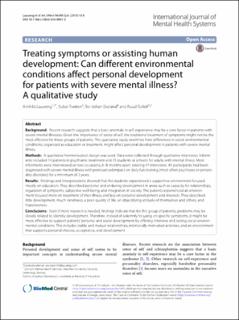| dc.description.abstract | Background Recent research suggests that a basic anomaly in self-experience may be a core factor in patients with severe mental illnesses. Given the importance of sense of self, the traditional treatment of symptoms might not be the most effective for these groups of patients. This qualitative study examines how differences in social environmental conditions, organized as education or treatment, might affect personal development in patients with severe mental illness. Methods A qualitative hermeneutical design was used. Data were collected through qualitative interviews. Informants included 14 patients in psychiatric treatment and 15 students at schools for adults with mental illness. Most informants were interviewed on two occasions, 6–8 months apart, totaling 47 interviews. All participants had been diagnosed with severe mental illness with pronounced impact on daily functioning (most often psychoses or personality disorders) for a minimum of 2 years. Results Findings and interpretations showed that the students experienced a supportive environment focused mostly on education. They described personal and enduring development in areas such as capacity for relationships, regulation of symptoms, subjective well-being, and integration in society. The patients experienced an environment focused more on treatment of their illness and less on personal development and interests. They described little development, much loneliness, a poor quality of life, an objectifying attitude of themselves and others, and hopelessness. Conclusions Even if more research is needed, findings indicate that for this group of patients, problems may be closely related to identity development. Therefore, instead of solemnly focusing on specific symptoms, it might be more effective to support patients’ personal and social development by offering intensive and lasting social environmental conditions. This includes stable and mutual relationships, intrinsically motivated activities, and an environment that supports personal choices, acceptance, and development. | |
